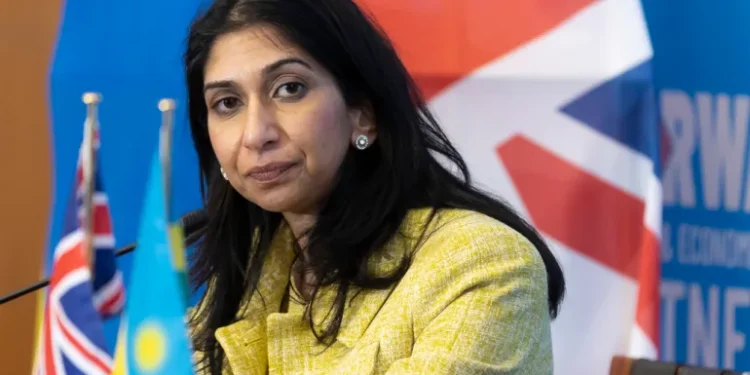Suella Braverman has been relieved of her duties as the United Kingdom’s (UK) home secretary following her defiance of Prime Minister Rishi Sunak, and his office, known simply as ‘No. 10’ in accusing the Metropolitan Police of bias in policing protests. The controversy unfolded against the backdrop of a crucial legal case regarding Braverman’s contentious plan to deport asylum seekers to Rwanda.
The UK’s supreme court is poised to rule on Wednesday on the legality of Braverman’s proposal, which aimed to send asylum seekers arriving in the UK through “irregular means,” such as small-boat crossings, to Rwanda. The government had contested an appeal court decision that blocked the scheme on human rights grounds.
The outcome of the legal battle was anticipated to influence Braverman’s political standing, which was already under threat after a tumultuous week. Labour had called for her dismissal, citing pressure on the London police during Palestinian protest marches and her controversial statement that homelessness was a “lifestyle choice.”
James Cleverly has been named as Braverman’s successor, leaving the foreign secretary position temporarily vacant. Braverman, who described serving as home secretary as “the greatest privilege of my life,” found her tenure cut short amid growing controversy.
The former prime minister, David Cameron, made an unexpected arrival at Number 10 on Monday, fueling speculation about a possible return to government as foreign secretary. Cameron, absent from Parliament since stepping down as prime minister in 2016, might be granted a seat in the House of Lords for this new role.
Braverman’s dismissal signals the commencement of a major Cabinet reshuffle by Chancellor Rishi Sunak as he reconfigures his top team ahead of the Autumn Statement next week.
Ever since her appointment as home secretary by former PM Liz Truss, Braverman had been viewed as a standard bearer for the right within the Conservative Party. In her statement, she remarked, “I will have more to say in due course,” prompting speculation about potential challenges to the leadership.
The catalyst for Braverman’s ousting was an article she penned for The Times, accusing the police of applying a “double standard” and taking a tougher stance on right-wing demonstrations. The article, not cleared by No. 10, revealed Braverman’s defiance of a Downing Street request to temper its content.
Labour, the Liberal Democrats, and some Tory MPs had united in calling for Braverman’s dismissal. Shadow home secretary Yvette Cooper criticised her actions as “highly irresponsible,” claiming they had exacerbated tensions and made the police’s job more challenging. The fallout from Braverman’s controversial tenure as home secretary continues to unfold, setting the stage for significant political developments in the days to come.
The position of the UK Home Secretary is a very important one as it oversees a wide range of issues such as national security, policing and immigration.
Mimi Mefo Info



